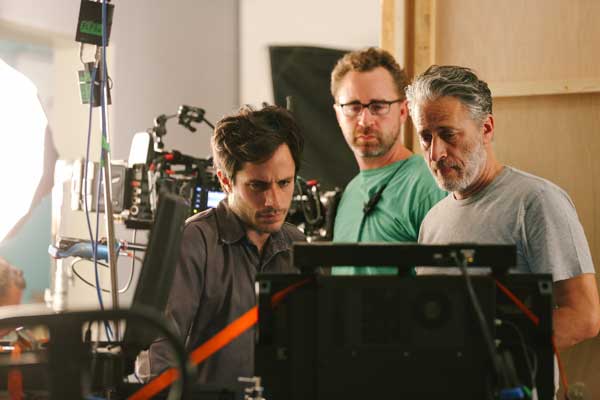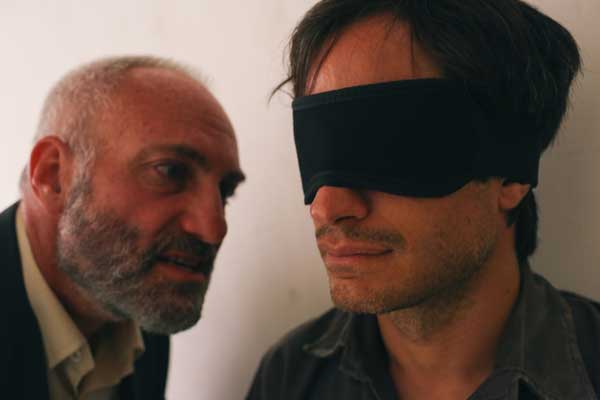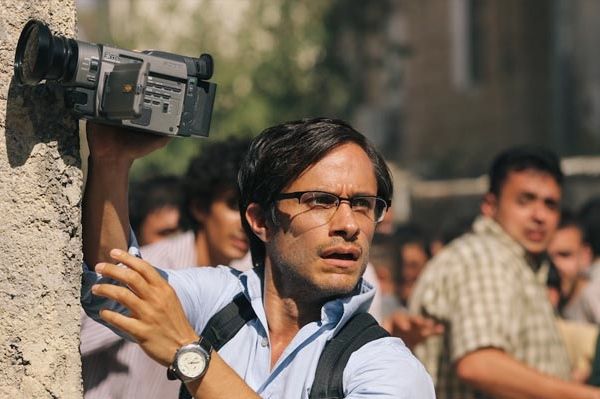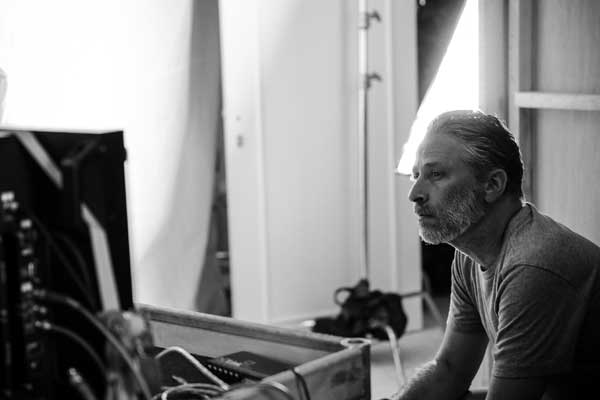Jon Stewart on Injecting Humor in ROSEWATER and His Next Controversial Film Subject
- Details
- Category: Interviews
- Created: Sunday, 16 November 2014 12:11
- Published: Sunday, 16 November 2014 12:24
- Written by Lupe R Haas

Jon Stewart’s ability to depict grave realities through a light-heartened lens is one of the central reasons that "The Daily Show" is so widely watched. The skill also has a profound effect on his directorial debut - ROSEWATER.
Based on the memoir, "And Then They Came for Me," the Iranian set political drama centers on Maziar Bahari (Gael Garcia Bernal), a journalist was imprisoned during the controversial 2009 elections in the region.
It has since come to light, Bahari’s imprisonment was connected to a satirical interview he participated in with "The Daily Show" when correspondent Jason Jones traveled to Iran.
The film illustrates his ability to cope with life in captivity by using his sense of humor and recalling his relationships with his father and sister - both of whom died in prison years earlier.
At a recent New York press conference for the film, Stewart and Bahari spoke about the potential repercussions of ROSEWATER, the state of journalism and filming in Jordan.
Q: Were you nervous about what would have when the Iranian government would find out about the film?
JS: I'm nervous when the weather changes, so that's a general state of being. It's sort of a lifestyle that I've embraced. You can't control how people see your work or what their reaction to it is. And I learned a long time ago that you can't try and outsmart crazy. So you do the best work you can do and you do it with the most integrity that you can and you tell a story in its finest iteration or you hope you can and you hope it's perceived in that way.
Q: How did you go about choosing the music? It helps keep the tone lighter. How did you choose the moments when it would shine through?
JS: So much of that is organic. You can't impose that on the story. If you did. The humor comes from the reality of how absurd the situation was. Maziar's not a spy. He hasn't done anything wrong. So they've got to create this scenario that implicates him in some way. And there is an absurdity to this idea that regimes have a kind of a monopoly on the truth. We try to capture that -- because it's from the book. Maziar's ability to recognize that as he was being held was one of the most remarkable things about the memoir that he wrote. So trying to capture that in its natural state rather than imposing it upon the film was where I tried to go with it.

Q: Given that journalism is a somewhat endangered profession these days, is there a feeling that you're trying to convey the importance of journalists and the risks that they take?
JS: Professional journalists are having a more difficult time...because citizen journalists are on the rise. Citizen journalists are replacing professional citizens. Information is becoming more democratized. What the film shows is this importance of citizen journalism all around the world. One of my favorite shots is the last one of that little boy filming the destruction of the satellite dishes, which shows this government thinking that it can create all these obstacles and barriers in the way of professional journalism and then a little Mozart citizen journalist comes along and films it and just puts it on YouTube or Facebook or Twitter and shows it to the world.
Q: It's well known from the Daily Show that you have a complicated relationship with 24-news cycle and cable news in particular. But this film shows a very euphoric or progressive approach to the social news cycle as well as other communications in the 21st century. How did you want to showcase that as a filmmaker?
JS: You can be critical of things that you think are not upholding the ideal of what you imagine journalism to be, but at the same time it's important then to demonstrate what that ideal may be. Because places are cutting back on the finances of journalists, well now a lot of them are out there without the support of infrastructure and support of these big news organizations -- they're freelancing -- and they're on their own. Even when you look at a case like James Foley: he was kidnapped by locals and they sold him to ISIS. It's the type of situation where you are in great peril and you don't know where it is. And it's all for the hope of capturing things that are happening in parts of the world that you think people should know about. And that's something that should be revered, protected, honored. Criticism comes from a feeling of disappointment in an ideal. When you recognize that ideal, it's important to highlight it and celebrate it and to try and preserve it and protect those who are risking so much to bring it.
JS: We assembled a team that were expert in the craft of film, from the cinematographer, Bobby Bukowski, all the way down to the editor, Jerry Rabinowitz. And I had Maziar's source material and Maziar himself as the touchstone of the film. So it wasn't so much external inspiration as it was "The Avengers, if you will, that we had put together that was influential.
Q: How did you reach out to Scott Rudin and producers like that without them thinking, “The guy from Big Daddy wants to make a movie.”
JS: There's a lot of, "The Guy from Big Daddy is here." I go to restaurants and it's like, "The guy from Big Daddy wants a cheeseburger." I get hell. Obviously it helped that I had some profile, so an added value to the project was that the director could go out and try and sell it in places. So you had that going for you. We had this incredibly compelling story. What also worked in our favor is, we were doing it and assembling it outside of the traditional development of a film. So by the time I went to them looking for finance, I had a script. I had a time frame that I had to shoot it in, because there's only a certain amount of time that I could be away from the show...So they had clarity in terms of what their involvement would have to be. And I was only in L.A. for a weekend. So it was one of those where...we set it up through Scott and through an agent that he works with at UTA ..."Send this to five or six independent financiers that you think might appreciate it or might take the material and if they're interested I'll meet with them when I'm there, and that's exactly how it went down, and by the end of that weekend we had our money and we had our time frame. My experience in the process was, You just always wanted to still be in the game at each stage...
Q: Did you cry when you first saw the movie?
JS: I can tell you I absolutely cried the first time I saw the movie: it was the rough assemblage. It was three-and-a-half hours long. I cried my eyes out. I was like, I can believe I spent a year and a half making a giant piece of shit! So I was very upset. ...Honestly, the times that I cried the most were on set... Watching it, I've seen it 3,000 times. Also, I don't want to spoil it, but I know how it ends. ...But yeah, there were some very poignant and very emotional things that occurred. And also there was a lot of emotion in the process of making it and gratitude towards the people that I know sacrificed an awful lot to be there, to do it. We got a lot of very experienced actors to work for no money in conditions that I'm sure were less than ideal than what they're accustomed to. Shoree Agashloo is kind of the heart of the whole movie -- she plays Maziar's mother. This is an Oscar-nomiated actress and I'm asking her to come over there and run around in 100-degree weather during Ramadan for a couple of weeks. The cast's belief in the story, the department heads' belief in the movie created an atmosphere that I was really grateful for, so a lot of my emotion comes from.
Q: What about the opening sequence?
JS: The scent of rosewater is somewhat that is used in the mosque to mask the perspiration of the devout. I just thought it would be a beautiful image to show the production of it, to show how it was made. But as I would watch it, the explicitness of it was kind of overwhelming. It was very much, Oh, I see, so something beautiful is ripped from its stem, crushed and put into boiling water and put under pressure and heat and then its essence is extracted from it. So what's your movie about? It's so explicit and on the nose...but fortunately, Maziar had put this beautiful poem by Shamlu at the front of his book, and it was the perfect antidote to cut the explicit nature of that opening scene, so it exists now as sort of a background in which Shoree doing the poem in Farsi underneath it gives it just enough distance that it doesn't overwhelm you. It's not so over the head.
Q: How were you able to replicate Iranian politics while shooting in Jordan?
MB: I grew up in Iran and I had worked in Iran...We were also lucky that some of our friends in Iran sent us some footage from Iran in order to show the POV shots. (street footage)
JS: It also does embrace a quiet inauthenticity. Originally, when Maziar and I first talked about it, and I would say -- I was a purist, "This must be done in Farsi! And it must be done with a cast of actors who have all been imprisoned in Iran!" But Maziar would very calmly say, "But don't you want people to see it?" I always deferred. If he was okay I was okay. I had to embrace my own limitations. My ear is not attuned to that accent. So I had to create a generalized palette. This is not a Southie movie. It's a movie about how someone can capture that one particular accent. The idea was to create a template that could fade back and let the story come to the fore. That was the general practice at every point in the movie.
Q: You said that Maziar humanized the people who tortured them because if you view them as monsters you can't fight them. My immediate thought was the hysterical news coverage about ISIS. What can we take from your story and your portrayal of it that we can apply to other demons?
JS: My next movie is about ebola!
MB: ISIS is another case where it's supposed to be this monstrous giant, this devil incarnate and something that is going to end Western civilization if it's not bombed to pieces. I think it's the wrong approach. ISIS, the Iranian regime, many corporations -- whatever institutions you're thinking about that about composed people are composed of of human beings with their vulnerabilities, weaknesses, good qualities. For me, to start with, it was a selfish decision to humanize him because I knew that I was fighting him on two different fronts. One was a physical battle that I knew I had lost from the beginning: I was a prisoner; I had a blindfold on; and he was stronger than me. But the other battle was the psychological battle that I had with him. And I knew that I could be a winner, because I had lived a richer life; I was more cultured than him; I was more open to ideas. So in order to take advantage of that superiority, I had to humanize him. If he was a monster, if he could not be manipulated, I was going to lose that psychological battle. So the massage scenes that you see, even though they're funny, came from that point of view. I recognized that this guy is an employee. He's working -- he could be a dentist, he could be an accountant, he could be a bookkeeper, whatever. He had a boss. So he had to give something to his boss. At the same time he had a wife. He spends all his time beating people, insulting people. He's horney! So I had to give him something in order to satisfy him. So based on all these calculations...I started these massage stories.
Q: How far in did you feel you could inject humor and humanize him?
JS: When they charged me with spying for four intelligence agencies, I was shocked...they wanted to name names at the beginning. And they wanted me to implicate people...and they were encouraging me to fabricate stories about different people. After a while when they realized that I was not going to that, they delved into my personal life and my sex life. They wanted to me to write those kinds of testimonies in order to implicate me because they wanted to portray me as corrupt... We may laugh about it but it is punishable by death in Iran. So I had to come up with a way that, okay, I was corrupt but I was not that corrupt there was no penetration as such. According to Islamic law you have to penetrate -- I'm giving you too much information! -- in order to be sentenced to death. So I had to come up with this ridiculous massage stories in order to be sentenced, but not be sentenced to death -- maybe 74 lashes.

Q: You deal with injustices. How are you able to keep your sense of humor?
JS: Did you ever hear of something...pause...it's called Xanax? Sometimes you take it with water at night, and it's very helpful! It's not so much how do you retain your humor. It's like saying, you eat a lot of meat, how do you keep digesting it? It is the enzyme that I use to process these events. One of the things that appealed so much to me about Maziar's (story) is that you imagine that you would retain that ability under duress. But it's a hypothesis. So to meet someone who had that ability in that situation -- the canary in the coal mine -- for him to maintain that and not only to maintain it but to be able to utilize it as his strength and as his way of defeating, it's an incredible real-life experiment.
Q: Can you talk a bit about casting Gael.
JS: This is a really dark story. You have to play with the nuances. Actors tend to want to overemphasize that aspect of it, so you'd get a lot of wrenching auditions. They were beautifully done, but they lacked the subtlety and agility. The thing about Gael that he had from the first audition was agility. If you remember there's one scene where Maziar is being told to call his wife for the first time. In the room he goes from terror, because the interrogator has told him to stand up, to incredulity that he's going to get a chance to call his wife, to unbridled joy at finding out he's having a baby girl to getting the shit kicked out of him to laughing in his face. And that all takes place in two-and-a-half minutes. That all takes place within two minutes. An ability for an actor to do that with grace and without drawing attention to his own craft is unheard of. I felt like Gael was the one guy who would capture that ability. Even in the audition he had glimmers of Maziar's mischief while still doing scenes of real duress. So for me it was a very clear choice.
